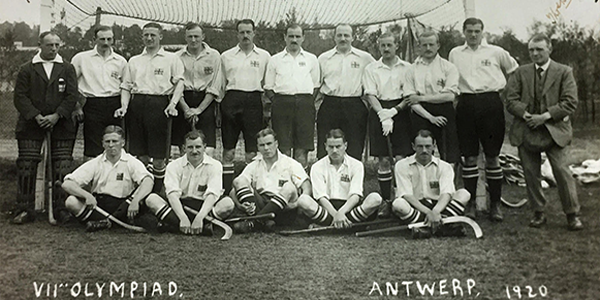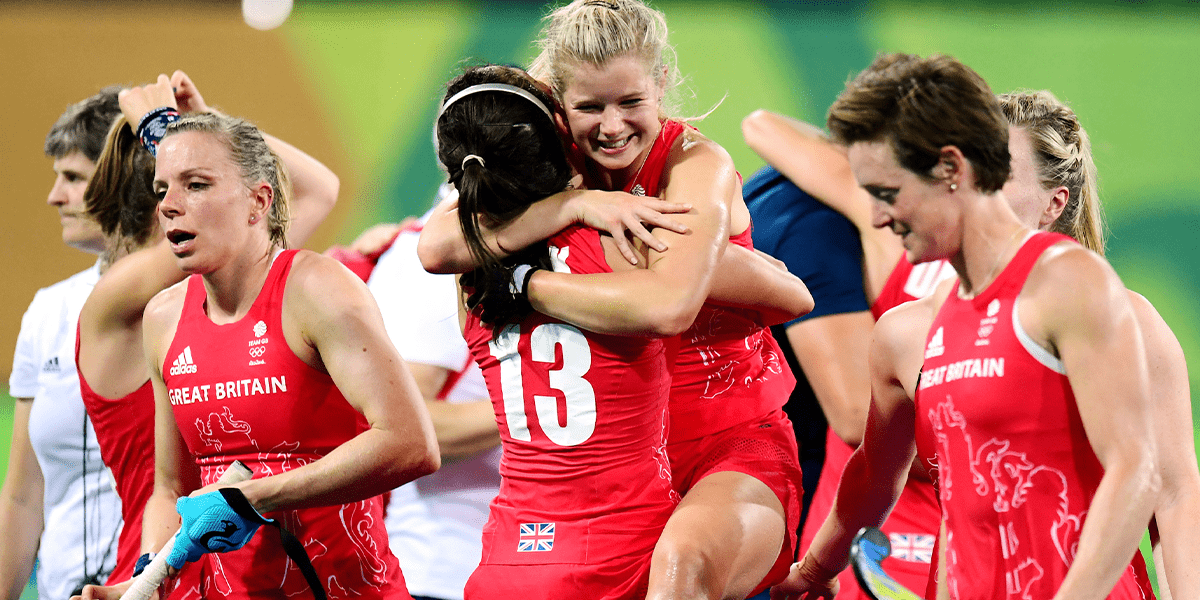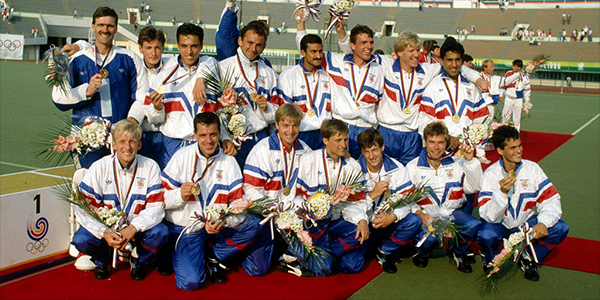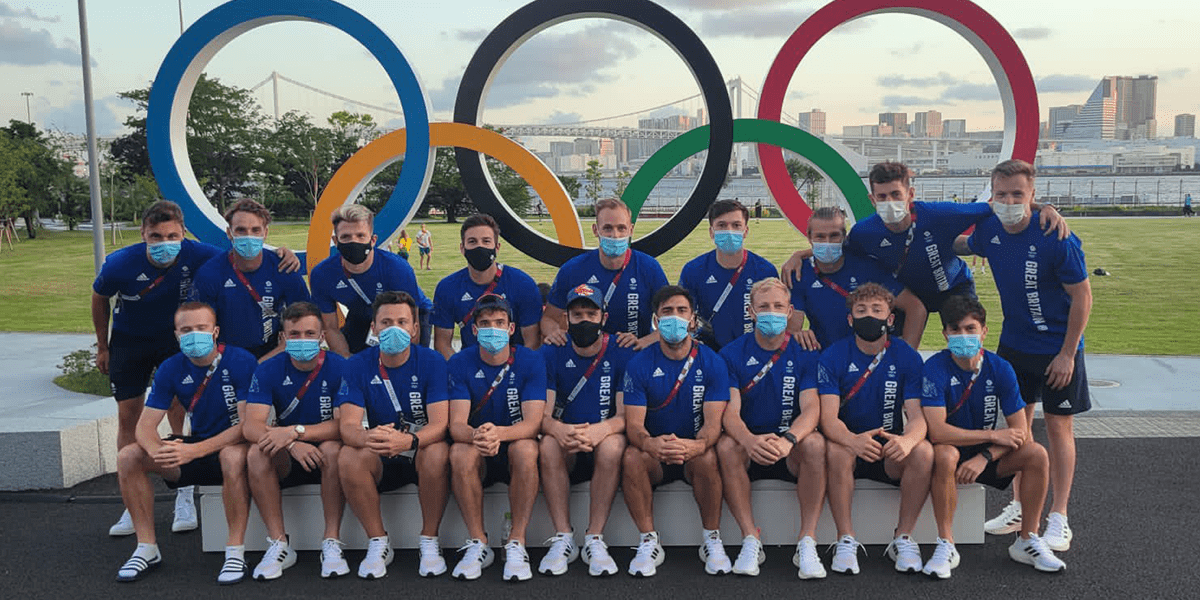With a total of 13 Olympic medals (including four golds), Great Britain currently sit fourth in the all-time medal table.
Along the way they have produced some of the most memorable moments in British Olympic history, with the men's stunning gold at Seoul 1988 immortalised by the quote 'Where were the Germans? But frankly, who cares?'
Meanwhile the women's incredible triumph at Rio 2016 was voted by the public as the second best British women's sporting moment of all time and the ninth greatest British Olympic sporting moment in BBC Sport polls.
It's not all been plain sailing for the British teams however and there have been plenty of bumps along the way. Read below to find out more.
-
It was a clean sweep of the medals for Great Britain when field hockey made its Olympic debut in 1908, with England's men claiming the gold while Scotland and Wales both secured bronze. Ireland's silver medal in the final also counted towards GB's overall medal tally.
When hockey next featured at the Games in 1920 the first official Great Britain Olympic team was fielded and again secured the gold, finishing top of a group including Denmark, France and hosts Belgium. They also recorded a 12-1 win over the latter which still remains the biggest victory for any British hockey team at an Olympics.
GB did not compete in an Olympic hockey competition again until the London 1948 Games. After a goalless draw in their opening game against Switzerland, they thrashed the USA 11-0 and Afghanistan 8-0 to progress to the semi-finals. They then overcame Pakistan 2-0 to reach the final but were unable to stop an incredible Indian side from claiming a fourth successive Olympic title.
Two years out from the 1952 Olympics in Helsinki, GB's participation looked in doubt after the board voted to withdraw their affiliation from the FIH. But after an objection from England and Wales it was decided this would not happen and the team subsequently went on to win bronze in Finland, overcoming Pakistan to secure the final medal.

-
Having won medals in each of their first four Olympic appearances, GB's men then went on a barren run that lasted more than 30 years. They came close to adding to their medal tally in both 1956 and 1960, finishing fourth on both occasions after being defeated in the bronze medal matches by the United Team of Germany and Spain respectively.
They failed to progress from the initial group stages at any of the next three Olympics before they were only named as a reserve nation for the 1976 Games in Montreal. Great Britain's boycott of the 1980 Olympics then the men missed out for a second consecutive Games while the women were denied an opportunity to make their debut.
-
After losing a series of play-off matches against Belgium, Great Britain's men looked set to miss out on a third straight Olympic appearance at the LA 1984 Games. But the boycott of the USSR meant the team were drafted into the line-up and they certainly made the most of their opportunity. They topped their group with four victories and a draw against eventual champions Pakistan but the chance of a fairy-tale gold was denied when West Germany beat them 1-0 in the semi-finals. But that didn't stop them and goals from Richard Dodds, Paul Barber and Sean Kerly (his seventh of the tournament) saw them emerge victorious over pre-tournament favourites Australia in the bronze medal match to secure their first silverware in 32 years.
The planning for the next Olympics in started on the plane home from LA and four years later it paid off handsomely as, in Seoul, the men then claimed their first gold since 1920. They reached the semi-finals by finishing second in the group, recording three wins and a draw whilst narrowly losing to West Germany. Sean Kerly - one of several squad members who lost in the semi-final four years previously - then ensured GB would return home with at least a silver, scoring a hat-trick as they beat Australia 3-2 to reach the final. Two goals from Imran Sherwani and another from Kerly then saw Roger Self's side standing on the top step of the podium, with commentator Barry Davies uttering the famous line: "Where were the Germans? But frankly, who cares?"
1988 also saw GB's women make their Olympic debut, with Moira MacLeod making history by scoring their first goal as they got their campaign off to the perfect start with a 1-0 win over Argentina. A draw against the USA in their final group game saw them progress to the semi-finals, where they lost 1-0 to South Korea before being beaten by the Dutch in the bronze medal match.
Spurred on by just missing out on a maiden medal, four years later the women ensured they didn't return home empty handed as they won bronze at Barcelona '92. Wins over South Korea and New Zealand saw them qualify for the semi-finals but a Jane Sixsmith goal was not enough to overcome Germany to reach the final. However, Sixsmith struck twice - including the winner in extra time - as they beat the Koreans again to secure the bronze.
There was to be no such success for the men this time round though. Going into the last group game, they knew victory over Australia would see them qualify for the semi-finals. But the Kookaburras were just too strong, beating them 6-0 and ensuring GB could not secure a third consecutive Olympic medal. They eventually finished in sixth.
-
After medals at three consecutive Games, GB's hockey teams endured a drop in form that saw them unable to secure any further silverware for the next four Olympics. The women finished fourth in 1996 - beaten to the bronze on penalties by the Dutch - but that was the closest either side came across a difficult few years in which the women did not qualify for the 2004 Games in Athens.
-
As the Games returned to the UK for the first time since 1948, hopes were high that Great Britain would secure their first Olympic medal in 20 years at London 2012. The women duly provided it too, winning bronze in front of thousands of cheering fans while the men came agonisingly close, finishing fourth.
Danny Kerry's women's team began their campaign strongly, recording high scoring wins over Japan, South Korea and Belgium. They then lost to China and The Netherlands but had done enough to qualify from the group and reach the semi-finals, where they were beaten 2-1 by Argentina. Determined to end their campaign on a high, they roused themselves for one final impressive performance as goals from Alex Danson, Crista Cullen and Sarah Thomas saw them beat New Zealand 3-1 to the delight of those packed into the Riverbank Arena.
GB's men qualified from their group unbeaten, their standout performance seeing them come from 3-0 down to draw 3-3 with Australia in arguably the best match of the competition. Having been unbeaten in their opening five matches, they were put to the sword by the Dutch in the semi-finals and were unable to finish in winning ways as Australia beat them to the bronze.
-
Who can forget the moment that Hollie Pearne-Webb jumped for joy after scoring the winning shootout effort that meant GB's women won that gold at Rio 2016?
It was the perfect end to the perfect tournament that saw the team win every single game they played. They eased through the group, starting off with an important 2-1 victory over Australia before also overcoming India, Argentina, Japan and the USA. A dominant first-half performance in the quarter-final saw them brush aside Spain before an Alex Danson double and a goal from Helen Richardson-Walsh saw the women qualify for their first every Olympic final, sparking scenes of utter jubilation after the full-time whistle was blown.
Standing between them and a first ever Olympic gold were the Dutch, considered by many to be favourites for the tournament having won the last two titles. Lily Owsley put GB ahead in the tenth minute, only for Kitty van Male to equalise shortly after. Maartje Paumen then put The Netherlands ahead but less than a minute later GB were level once again thanks to Crista Cullen.
The reigning champions bombarded Maddie Hinch's goal in the second half and took the lead through van Male in the 37th minute. GB hung on though, keeping out wave after wave before bringing the game level once again in the final quarter courtesy of Nicola White. The game ended level at 3-3 and, with neither side able to find a winner in extra time, the final went to a shootout.
By now, 10 million people were watching live on BBC One. The 10 o'clock news had been moved. The nation was gripped, caught up in the emotion of watching 16 women giving everything they had to win an Olympic gold.
Step forward Maddie Hinch. Having already saved a penalty stroke during the game, the goalkeeper used the notes on her water bottle to perfect effect as she kept out everything the Dutch through at her in the shootout. After missing their first two efforts, GB took the lead through Helen Richardson-Walsh before Pearne-Webb stepped up to slot the winner home and send the team - and everyone watching at home - into euphoric celebrations.
-
Delayed by a year due to the Covid-19 pandemic, the Tokyo 2020 Games took place in the summer of 2021 with GB's women aiming to follow up on their Rio 2016 triumph while the men were hoping to take home a first medal since 1988.
It was a good start for both teams as they progressed out of the group stages in third place. The men began with 3-1 victories over South Africa and Canada before suffering a heavy defeat to Germany. They hit back impressively against The Netherlands in their next game though, Sam Ward scoring twice in the final quarter to see them come from behind to draw 2-2 with the Dutch. They would then repeat that scoreline against reigning world champions Belgium in their final pool fixture.
Despite enjoying plenty of possession, the women began the defence of their Olympic crown with a 2-1 loss to Germany. They responded in fine fashion though, recording successive 4-1 victories over South Africa and India before they were narrowly beaten 1-0 by the Dutch. Their final group game saw them comfortably overcome Ireland 2-0 to qualify for the quarter-finals.
The two teams experienced contrasting fortunes in the final eight, with the men being knocked out of the tournament after defeat to India. Two mistakes in the first half allowed the Indian team to capitalise before Sam Ward set up a grandstand finish with an equaliser at the end of the third quarter. However GB couldn't find the elusive equaliser and with three minutes to go India scored again to secure a 3-1 victory.
A sublime individual goal from Hannah Martin saw the women take an early lead in their quarter-final against Spain before a brilliant corner routine saw the 2018 World Cup bronze medallists level proceedings shortly after. Grace Balsdon produced a stunning corner to give GB the lead once again but a mistake saw Spain level and take the game to a shootout, where Maddie Hinch was to be the hero once again as she saved all four efforts she faced while Martin and Sarah Jones scored to take their team through.
The semi-final against the Dutch was a chastening experience as GB lost 5-1, meaning they would contest the bronze medal game against India. They took an early lead through Ellie Rayer and Sarah Robertson before the Indians hit back in style, scoring three goals in four minutes to head into half-time in front. Hollie Pearne-Webb smashed home an equaliser early in the second half before Balsdon bagged her third goal of the Games to secure the bronze.
Following on from the bronze at London 2012 and gold at Rio 2016, it was the first time a British hockey team had medalled at three consecutive Olympic Games. Furthermore, Laura Unsworth became the first British player (male or female) to win three Olympic medals.



